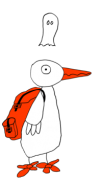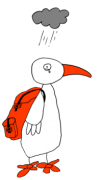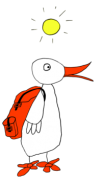An introduction in your organisation comprises of:
- Introduction: presentation and explanation of the methodology (2 hours)
- Training for social workers (2 x 3 hrs) in how to work with this methodology.
- Workshop with max 10 foster children delivered by the team (2 hrs)n gegeven door de therapeuten (2 uur). Two staff members of the organisation join the workshop to be able to do more workshops themselves.
- Workshop for foster parents and social workshop with information about the methodology and instruction for further application of the materials at home.
- Home appointments of trained social workers with individual children to play the computer game.
- Follow-up appointment of social workers with the children to make the link between the story of the duck( the book they made with the game) and the own story of the child.
- On distance support by My Backpack team.
- Feedback session after the introduction with the My Backpack team and appointments for further implementation of the method in the organisation.
- Follow up workshop with the children in which they build on the previous activities and work further on dealing with emotions.
What users tell us:
 Users are very enthusiastic about the method. The materials and methods of working in the workshop invite children to speak and open up. It teaches them to visualise and feel emtions through music, drama, movements all in a safe environment.
Users are very enthusiastic about the method. The materials and methods of working in the workshop invite children to speak and open up. It teaches them to visualise and feel emtions through music, drama, movements all in a safe environment.
There is a lot of fun whilst playing the computergame and at the same time the children show emotions and ask questions. Social workers enjoy being with the children and have tools to make contact. Most of the time the children start to ask questions about their past or tell stories they never told.
Some remarks of the users:
Children:
 “when I grow older I will continue to play with the duck, it is my friend”
“when I grow older I will continue to play with the duck, it is my friend”
“The duck accompanies me with the backpack to play therapy and also sleeps with me in my bed. In therapy we also work with the emotion cards.”
“The Duck dad and mom were sad when Duck left but for Duck it was OK; she felt very lonely in the duck family”
Pleegzorgwerkers:
“I have a special bond with the child after we played the game. I can now also speak with the child about other things more easily. She know she can use me to tell things that happen in the foster family”
 “Great afternoon playing with the child, he inserted many other stories in the game. He now wants answers to questions that were raised in the game and wants his story to be written down. We have made an appointment with the parents toget answers to these questions.”
“Great afternoon playing with the child, he inserted many other stories in the game. He now wants answers to questions that were raised in the game and wants his story to be written down. We have made an appointment with the parents toget answers to these questions.”
“Children found it special that I came only for them that afternoon. They understand that you speak about Duck but in fact it is about them. Still it is easier to speak about Duck”
“The children loved the workshop and meeting other children living in foster care and they also loved to speak about their situation so openly. They could explain that their mother was mentally ill”
“Two boys became “friends” and after they both had done the game we arranged a meeting between them. They were happy to have a foster child friend who understands them and a social worker who also plays soccer”